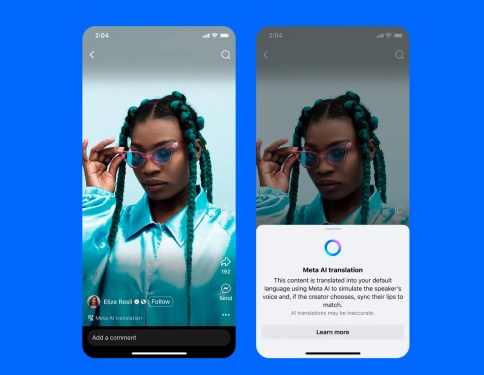Meta is rolling out an AI-powered voice translation feature to all users on Facebook and Instagram globally. The new feature, available in any market where Meta AI is offered, allows creators to translate their content into other languages to reach a broader audience.
This feature was first announced at Meta’s Connect developer conference last year, where the company detailed plans to pilot test automatic translations of creators’ voices in reels. The AI translations are designed to use the sound and tone of the creator’s own voice to make the dubbed version sound authentic. Creators can also optionally use a lip-sync feature to align the translation with their lip movements for a more natural viewing experience.
At launch, the feature supports translations between English and Spanish, with more languages planned for the future. These AI translations are available to Facebook creators with 1,000 or more followers and to all public Instagram accounts globally where Meta AI is available.
To use the feature, creators can select “Translate your voice with Meta AI” before publishing their reel. They can then toggle the translation on and choose whether to include lip-syncing. After clicking “Share now,” the translation will be processed and available automatically. Creators can preview translations and lip syncs before posting and can disable either option at any time without affecting the original reel.
Viewers will see a notice at the bottom of a translated reel indicating it was translated with Meta AI. Those who prefer not to see translated reels in certain languages can disable this in their settings menu.
Creators will also gain access to a new metric in their Insights panel that shows views by language. This data will help them understand how their content is reaching new audiences through translations, a feature that will become more useful as additional languages are added.
Meta recommends that creators face forward, speak clearly, and avoid covering their mouths when recording for best results. Minimal background noise or music is also advised. The feature supports up to two speakers, provided they do not talk over each other.
Additionally, Facebook creators will be able to upload up to 20 of their own dubbed audio tracks for a reel to expand their audience beyond English or Spanish speakers. This manual option is found in the “Closed captions and translations” section of the Meta Business Suite and supports adding translations both before and after publishing.
Meta has confirmed that more languages will be supported in the future but has not specified which ones or when they will be added. The company believes this technology will help creators overcome linguistic and cultural barriers to grow their followings and get more value from the platforms.
This launch coincides with reports that Meta is restructuring its AI group to focus on four key areas: research, superintelligence, products, and infrastructure.

